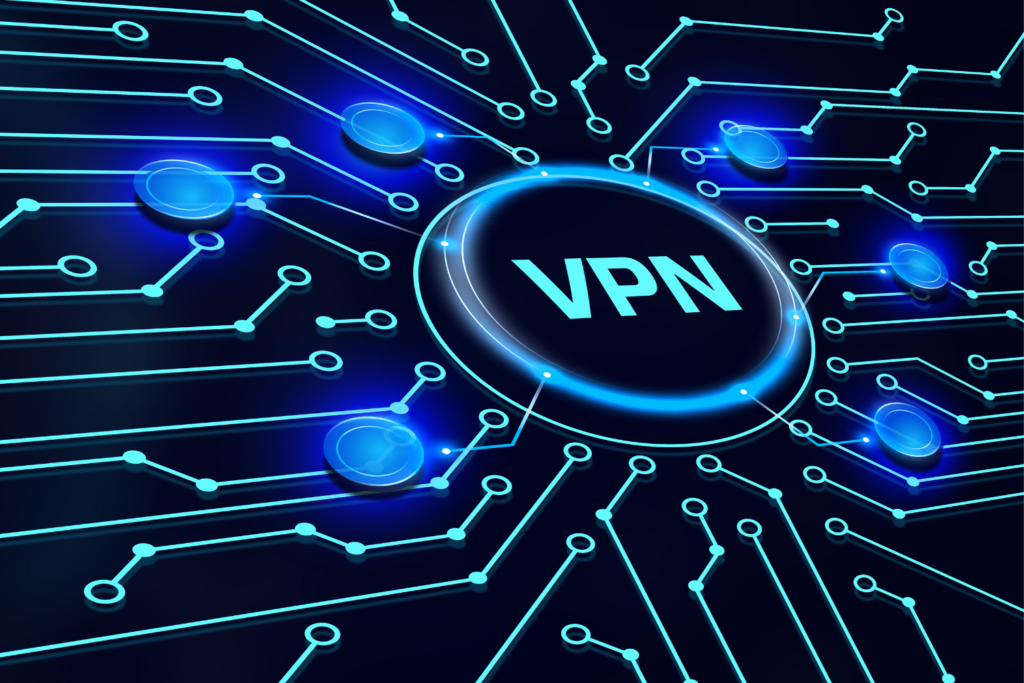VPN (Virtual Private Network) is a service that provides greater anonymity on the Internet and effective protection against cybercriminals – even on unsecure public networks. Check what VPN is and how it works. Why will it be useful to you even when watching movies and series on streaming platforms?

VPN – what is i?
VPN is an abbreviation for Virtual Private Network. With this service, you hide your identity while using the network and secure your internet connection from third parties who want to track your activity or even steal confidential data using malware. VPN as an IT service in the field of cybersecurity and compliance is also available for companies.
How does VPN work?
If you want to surf the web safely and ensure your online privacy, you need to install a VPN client on your chosen device, such as a laptop. This software creates a so-called tunnel that leads traffic from your device, through the VPN server, to the internet.
This process allows you to encrypt your data and mask your IP address (Internet Protocol), a unique series of numbers that identifies your device connected to the network. As a result, tools that track visits to websites “see” the IP address assigned to the VPN server located in a different location. However, remember that if you log in to your Google account, for example, your entire search history will be saved on it, unless you change your settings.
A VPN tunnel is based on the encapsulation process. This allows other people to find out that you are using a virtual private network, but they have no idea what you are doing online. Additional provider services also allow you to mask the fact that you are using a VPN.
What are the main features of a VPN?
The main features of a VPN are:
- Hiding your IP address and location,
- Concealing your online activity,
- Encrypting your internet traffic,
- Increasing your online privacy,
- Reducing AI-generated e-commerce ads based on user behavior in online stores,
- Protecting against cyber threats,
- Bypassing media restrictions,
- Using public Wi-Fi more safely.
How Does VPN Protect Online Privacy?
How Does VPN Encryption Affect Data Security?
Encrypting data prevents unauthorized parties from reading it. When you use a virtual private network, the VPN client and server generate a unique, complex encryption key that is used to encode and decode your data. This prevents anyone from reading it. In addition, VPN providers use strong encryption algorithms, such as AES-256.
According to Surfshark, decrypting a user’s encrypted VPN session can take up to… trillions of years, depending on the device and type of service. What’s more, the software can change the key every few minutes, making it even more difficult for cybercriminals to crack the code.
How Does a VPN Help You Browse the Internet Anonymously?
While a VPN doesn’t provide 100% anonymity when browsing the Internet, it does significantly increase your online privacy, such as freeing you from advertisers tracking your activity on digital platforms. As a result, you see fewer banners that are designed to lure you back to online stores.
What are the benefits of using a VPN?
Does a VPN increase security when using public Wi-Fi?
Yes, a VPN increases security on a public network, such as hotel Wi-Fi, which is particularly vulnerable to cyber threats. The encryption tunnel provides an effective protective barrier for the data you send, which is vulnerable to so-called sniffing, also known as eavesdropping or snooping. In these criminal scenarios, hackers act as “middlemen” who intercept your information, such as online banking passwords, before it reaches the intended recipient. A VPN makes it impossible for cybercriminals to read it.
How does a VPN allow you to access blocked content?
If you are temporarily in a country that has blocked certain applications or websites, such as social media, you can use a VPN to bypass the geoblock. Traffic routed through the VPN server is encrypted, and your IP address and real location are masked.
How does a VPN help protect you from online tracking?
Whether you use the internet for entertainment or work, your online activity is monitored by, among others, website owners. Analytics tools allow them to determine how you use the site so that they can then show you personalized advertising. A virtual private network provides you with greater anonymity by hiding your IP address and encrypting your internet traffic. VPN service providers provide their customers with extensions that can be used to, among other things, automatically reject cookies on every website.
How to Choose the Right VPN?
What to Look for When Choosing a VPN Service?
How to Choose a VPN Service to Enjoy Online Security and Privacy? Pay attention primarily to:
- VPN protocol type (differences include speed, connection stability, code structure, and adaptation to various operating systems),
- encryption algorithm,
- level of difficulty of self-configuration,
- application in terms of devices and web surfing purposes,
- additional services provided by the provider.
Are free VPNs safe?
If you use a free VPN service, you run the risk of not having your data properly secured. There is also the risk that the free software provider is actually collecting user information to sell or even share with criminals. Professional VPN services require a large investment of money to maintain and secure the entire infrastructure.
How important are VPN provider privacy policies and location?
VPN provider location is important in terms of storing user data and sharing information with third parties. This is due to local regulations. For this reason, it is worth verifying where the VPN provider is from and what provisions are included in the terms of service and privacy policy.
FAQs: VPN – what is it?
What devices can be connected to VPN?
The availability of VPN on stationary devices (e.g. smart TVs and consoles) and mobile devices (e.g. smartphones, tablets) depends on the service provider. Importantly, the VPN service can be configured directly on the router, thus securing the entire home network.
Does VPN slow down the speed of the Internet?
VPN affects the speed of the Internet connection because it requires appropriate bandwidth to encrypt the transmitted data. The scale of the slowdown depends on the service provider, but the reduction in speed is not felt in the same way during different online activities. You can check the possible difference at https://www.speedtest.net/.
Is using VPN legal?
Yes, using VPN is legal, but service providers stipulate that their software may not be used for illegal purposes. Users undertake to comply not only with the terms of the agreement concluded with the VPN provider, but also with the terms of use of the websites they visit when the VPN client is active.
How to configure VPN on your device?
The methods for configuring VPN on the device depend, among other things, on the provider and the operating system. Most service providers provide applications that you simply install and run on selected devices. This eliminates time-consuming manual configuration. VPN installation for employees is provided as part of the company’s IT support.
Can I use VPN to watch content from other countries?
In theory, the VPN service allows you to access media intended exclusively for Internet users living in other countries, such as movies and series on streaming platforms. In practice, turning on VPN to watch content from other countries is against the terms of use of these platforms. For this reason, VPN providers emphasize that the service is only used to ensure online privacy and increase network bandwidth when watching subsequent episodes of a series or a full-length film.

